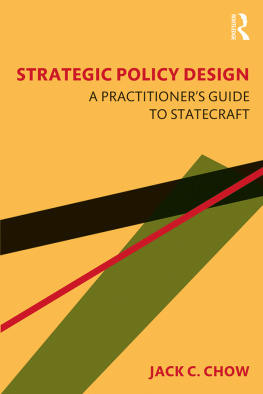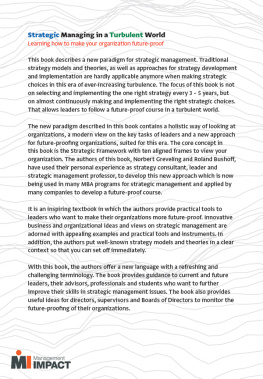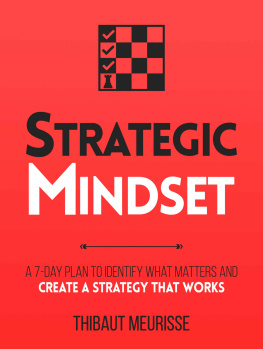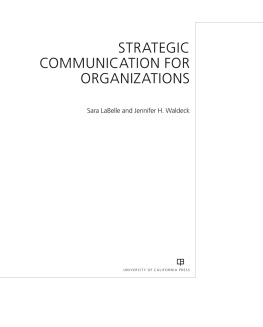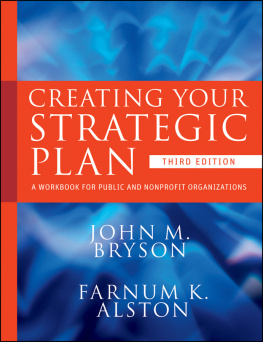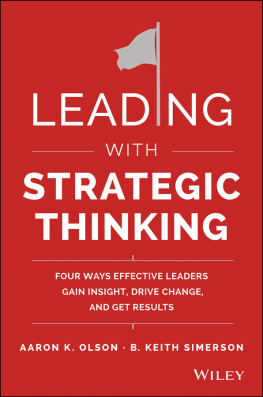Strategic Policy Design
Modern organizations, whether public or private, are animated by a universal imperative: to achieve prominent goals that fulfill their mandates and uphold deeply held values and ideals. To realize this imperative, leaders entrusted to pursue organizational missions need to exercise a core set of strategic skills, discern opportunities, identify worthy goals, and implement pursuing actions. Strategic Policy Design introduces an integrated architecture for strategic thinking that enhances leadership skills in gauging conditions and crystallizing plans. This framework promotes a structured approach to strategic tasks by offering templates for decision making, from articulating a strategic mission, understanding the environment in which an organization operates, and rallying people and resources toward attaining strategic goals to a portable, versatile framework for the development and writing of strategy-oriented communications.
For practitioners of policy, this book offers clarity of strategic thinking and introduces a new framework with which to perceive policy environments, identify and define goals, and organize strategies. For students, this book explores the skill and art in exercising leadership, encompassing both pragmatism and idealism. By learning and applying the showcased techniques, students will be equipped with a heightened awareness of policy domains, goal construction, and operational planning. Students in public-sector studies will find this book of interest, as will those studying political science, public administration, law, foreign affairs, international development, history, military sciences, and similar majors. The organizational perspective in strategy will also appeal to students in both business and non-profit sectors.
Jack C. Chow served as U.S. Ambassador and Deputy Assistant Secretary of State for global health and science issues during the presidency of George W. Bush, and he subsequently was Assistant Director-General at the World Health Organization. He held posts within the legislative and executive branches of the U.S. government and was a consultant at RAND Corporation and McKinsey & Company. He is a Distinguished Service Professor (adjunct) in the Washington, D.C. program of Carnegie Mellon University, Heinz School of Public Policy and Management.
Strategic Policy Design is a flexible tool for educators and a valuable resource for aspiring leaders at every level. While policymaking processes are the central focus of courses on public policy, we should not overlook that the future quality of those processes begins todaythe moment we begin to teach our students to think like leaders. Effective leadership is all about strategy, and this book provides an efficient framework for introducing students to this skillset.
Jangsup Choi, Texas A&M University-Commerce, USA
First published 2020
by Routledge
52 Vanderbilt Avenue, New York, NY 10017
and by Routledge
2 Park Square, Milton Park, Abingdon, Oxon, OX14 4RN
Routledge is an imprint of the Taylor & Francis Group, an informa business
2020 Taylor & Francis
The right of Jack C. Chow to be identified as author of this work has been asserted by him in accordance with sections 77 and 78 of the Copyright, Designs and Patents Act 1988.
All rights reserved. No part of this book may be reprinted or reproduced or utilised in any form or by any electronic, mechanical, or other means, now known or hereafter invented, including photocopying and recording, or in any information storage or retrieval system, without permission in writing from the publishers.
Trademark notice : Product or corporate names may be trademarks or registered trademarks, and are used only for identification and explanation without intent to infringe.
Library of Congress Cataloging-in-Publication Data
Names: Chow, Jack C., 1960 author.
Title: Strategic policy design : a practitioners guide to statecraft / Jack
C. Chow.
Description: New York, NY : Routledge, 2020. | Includes
bibliographical references and index.
Identifiers: LCCN 2019040340 | ISBN 9781482239928 (hardback) |
ISBN 9781003009009 (ebook)
Subjects: LCSH: Political planningUnited States.
Classification: LCC JK468.P64 C56 2020 | DDC 320.60973dc23
LC record available at https://lccn.loc.gov/2019040340
ISBN: 978-1-4822-3992-8 (hbk)
ISBN: 978-1-003-00900-9 (ebk)
Typeset in Times New Roman
by Apex CoVantage, LLC
To my late parents
Chuen-Tyi and Theresa Tse-Wen Chow,
who both ennobled my brothers and me
to enter public service
in gratitude for all that America has gifted to us.
I am grateful for the professional opportunities and responsibilities that have been bestowed upon me by leaders of several prominent organizations. The entirety of my experiences enabled me to become a leader in my own right, chiefly in the field of global health diplomacy. My professional origin was that of being a physician specializing in health policy. Training as a doctor reinforced my natural empathic self as well as rooted me in the ways of science and analytics. As I further evolved my skills and thinking in the realms of policy beyond the formal bounds of healthcare, I began to see more clearly how professional training can cause a type of self-compartmentalization among practitioners, who, having invested heavily to achieve their statuses and expertise, tended to aggregate into insular, often tribal, communities within organizations.
Through my participation in countless meetings and projects, I came to see how such compartmentalization of expertise and interactions, however unintentional or unnoticed, locked in and shut off value creation across the whole of organizations and across broader sectors. Sometimes groups were divided across their functional roles; to make something work, one group might insist that others take actions that strictly conform to standards that they, or their professional tribes, have defined. At other times, groups undertook hardline positions arising from narrow self-viewpoints that excluded substantive understanding of other parties interests.
To resolve some of these differences I found myself undertaking bridging roles that required crossing over into different spheres of expertise and expectations. To adapt, I began to create my own sets of rules and approaches, some of which were created on the spur of the occasion.
Over time I kept note of my self-originated recipes for action, many of which are frameworks in a heuristic style, cast in the form of acronyms or alliterations for better mental retrievability during times of intensity. When I began teaching graduate and undergraduate students in public policy, I shared my framework approaches with them to guide them toward structured thinking and writing and found many students especially appreciated having widely applicable methods to frame issues across several disciplines. A former colleague urged me to author a book with my approaches so that students and professionals alike, in wherever part of the world, might benefit and apply them with productive effect in their careers. This book, after a long period of gestation and formulation, is the fulfilling result.
It is my aim and purpose that this book and the tenets contained within serve as a practical form of intellectual software for policymaking applicable not only within the public sector, but to any organizationwhether public, private, or non-profitpursuing missions of complexity. While written by a physician, this book is non-technical, with frameworks of generic applicability for readers across a wide spectrum of professions, especially those involved in soft power issues. Furthermore, with modern career tracks becoming increasingly cross-disciplinary, I also hope that this book serves another purpose as an analytical passport that enables students and practitioners to cross whatever boundaries, professional or tribal, they might encounter and to unify those communities toward achieving ever-higher levels of value and fulfillment.

